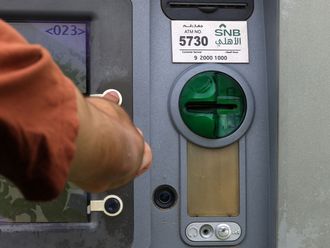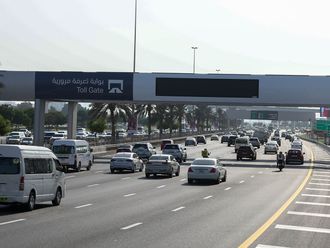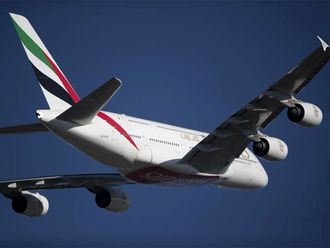
Dubai: Everything's going right for the UAE's health care sector — a growing population base, a high incidence of lifestyle diseases among residents, and pricey drugs with which to treat them.
But those seeking medical treatment may not share in these bullish sentiments as the high prices of medicines is one bitter pill too many.
Their angst would only grow if they looked to Saudi Arabia and found the very same prescription drugs cost much less, even 15 to 20 per cent less than what they are in the UAE. But they can also take heart from assessing the situation in Qatar, where prices for the same medications are much higher than they are here.
Therein lies a conundrum for the Gulf's health care and pharma industries. There is no uniformity when it comes to the setting of drug prices in these markets, but what exacerbates the situation — at least from a patient's perspective — is the often wide disparity that exists.
Is it then time for GCC authorities to consider a standardised drug pricing policy? Dr Azad Moopen, chairman of DM Health Care, which operates a network of health care facilities and pharmacies in the Gulf, is unequivocal on this: "It is better to have a unified drug registration policy for the whole GCC which will make it easy for manufacturers and distributors with registration in one of the countries."
There are many in the industry who believe a unified drug pricing policy is just what these markets need.
"There's very little price differential on a whole range of commodities in the GCC marketplace; then why not have the same for drugs?" queried a senior official with a health insurer. "The Gulf authorities should work towards such a realisation… even if they encounter resistance from the pharma companies."
Uniform — and lower — drug prices for GCC residents is as noble an intention as any. But effecting such a programme would be no joyride. It may also not be a workable solution.
Small market
"Due to the small size of the GCC market and increasing trend of privatisation, it is not viable to standardise prices of drugs in the region," a new report on the GCC pharmaceuticals industry issued by Alpen Capital (M.E.), said. "However, the proposed common medicine prices move may also impose strict pricing restrictions on the GCC states, subsequently limiting profitability for foreign drugmakers."
Moreover, "Local manufacturers find it hard to squeeze margins significantly, as manufacturing is attached with huge operational costs and cutting margins may erode commercial sustainability," the report added.
Saudi Arabia can have a lower drug pricing regime — and get pharma companies to comply — because of the size of the population, while Qatar's lower volumes and high per capita income have led to high drug prices there. The UAE's drug prices would fall somewhere in between.
"According to the WHO survey, in 2008, drug cost in the UAE was 23 times more than internationally recommended prices," said the Alpen Capital report. In addition, some national pharmacies sell generic medicines that are 13 times costlier than international reference prices, according to WHO statistics 2009.
"Such inequality is due to the small size of the domestic pharmaceuticals market, which restricts price negotiation powers with pharmaceuticals companies."
For a marketplace such as the UAE, the dependence on imports for its drug requirements is marked, and estimated at around 80 per cent. Ironically, the local pharmaceutical company Julphar exports 90 per cent of its production outside the GCC "as imported branded drugs are preferred to locally-made generics in the region," the Alpen Capital report said.
In other words, this does not say much for the argument in favour of allowing more drug manufacturing capacities in the local and Gulf markets.
Even if a uniform pricing initiative remains elusive, drug prices in the UAE — and elsewhere in the Gulf — have still come down significantly, with the concerned authorities taking a proactive stance on the same.
Lower prices
A spokesperson at Banaja Holdings, the Saudi health care major, says this is very much the case. "In fact, prices are much lower than two years ago, and commissions for both the pharmacy and the agent are also lower.
"In the past the Ministry of Health has implemented a one-price structure with a fixed mark-up on all pharmaceuticals for both agent and the pharmacy, regardless of the drug price.
"There are three categories: for example; Category One from 1-50 (in the) local currency carries a higher commission, Category Two from 51-100 comes with a lower commission and finally Category Three of over 101 having an even lower commission. This obviously has a positive impact on controlled prices in the third category."
But there's only so much of a decline in prices that the local health care market can accommodate. "Any further reduction may affect the survival of the retail which shall be counterproductive," said Moopen.
Decline in euro
Keeping drug prices in check has also been helped from an indirect development — the sharp decline in the euro's value. The bulk of drug imports into the GCC are from the EU. Already, it has impacted on end-user pricing in the local market, with some prescribed medication seeing price declines of 10 to 15 per cent.
As far as local and GCC residents are concerned, or at least those seeking medical treatment, a low euro is just what the doctor ordered.
However, the Banaja Holdings spokesperson asserted that currency changes have only limited impact where the end-user is concerned.
"Yes, most drugs in the GCC are coming from the Eurozone, but currency volatility has more of an impact on distributors than patients because it's the Ministry of Health that fixes the price yearly or, as in some countries, every six months.
"And that rate is lower than the actual exchange rate. This is why in Saudi Arabia, the major GCC market, prices are fixed on its local currency."
Time to look at alternate sourcing arrangemets
Dubai With drug imports from the US and the EU coming with a stiff premium, the time may have come to have alternate sourcing arrangements. Of course, provided the GCC's authorities allow it.
"The exorbitant cost of medications in the Gulf is a burden for the individual, insurance companies and the governments," said Dr Azad Moopen of DM Health care. "Quality medicines manufactured to international standards can be sourced from many countries at a much lesser cost than those made by multinational drug companies.
"In view of the focus on reduction of medical bills, it may be worthwhile exploring alternate sources for quality medicines. It may also be worthwhile to explore the possibility of switching over to generic medicines instead of branded ones wherever possible, as it is being done in many developed countries."
To compensate for their relatively small size, countries like Oman, Bahrain, Qatar and Kuwait, are working on securing "strategic" trade partners for low-cost generic drugs distribution. "This serves as an alternative to setting-up of manufacturing bases which multinational drug makers do not find attractive enough due to pricing limitations," said the Alpen Capital report.
The changes that will take place to the region's changing demographics require the population to lower cost treatments and drugs. Over the next decade, those who are above 65 years will make up 4 per cent of the population as against the current 2.7 per cent. Also, the overall population has been growing at 3 per cent annually from 2004. According to Alpen Capital, pharmaceuticals sales in the GCC would total $5.6 billion (Dh20.5 billion) at year end. These are expected to grow 6 to 8 per cent in the next ten years to between $9.9 billion to $11.6 billion in 2020.
A slew of critical drugs are nearing the end of their patent cycle, which represents opportunities for the GCC pharma sector especially on the manufacturing side. Generic drugs will also get their rightful place in the prescription process.
Already, "The governments are allowing up to 100 per cent foreign and private ownership in local manufacturing companies and offering greater support for development of in-house R&D facilities to the companies," said the Alpen Capital report. "This offers great potential for drug makers in terms of sales in GCC, especially in the generic drug sector."
Pharmaceutical imports
The GCC currently imports more than $1 billion of pharmaceutical products every year, mostly from the US and Europe. The lowerpriced generic drugs account for a marginal 5 to 6 per cent share.
"When you look at patented drugs still under FDA's (of the US) protection, it's their respective companies that own the marketing and production rights," said the spokesperson from Banaja Holdings. "They can either produce their drugs from their own approved facilities or transfer the production rights to other manufacturers, for instance, in India or South Africa under contract manufacturing. Once the FDA protection expires it's the company's decision to continue manufacturing abroad - mainly because it is less costly."
In recent years, Saudi Arabia has had success in bringing in overseas pharma companies in production facilities in the kingdom. If output from these plants are allowed GCCwide distribution, that can be the catalyst for more such ventures in this space. This could conceivably be through a new centralised system — the Gulf Central Committee for Drug Registration — which currently runs parallel to the individual regulatory regimes of the GCC countries.
"To synchronise varying drugs prices in all GCC countries, governments are striving to unify regulatory processes and introduce a central registration procedure that will have a consolidated effect on all regulations pertaining to registrations in the region," the Alpen Capital report said.
But getting all the GCC states to sign up to any unified regime is no easy task, as has been amply proved by the move towards a common currency. This is the reason why no one expects a unified drug registration regime to take effect any time soon.
Even then, with more local manufacturing, those drugs will carry a lower price tag for the end-user or the insurer footing the bill. For GCC residents, that would make whatever prescriptions their doctors offer that much more palatable.












